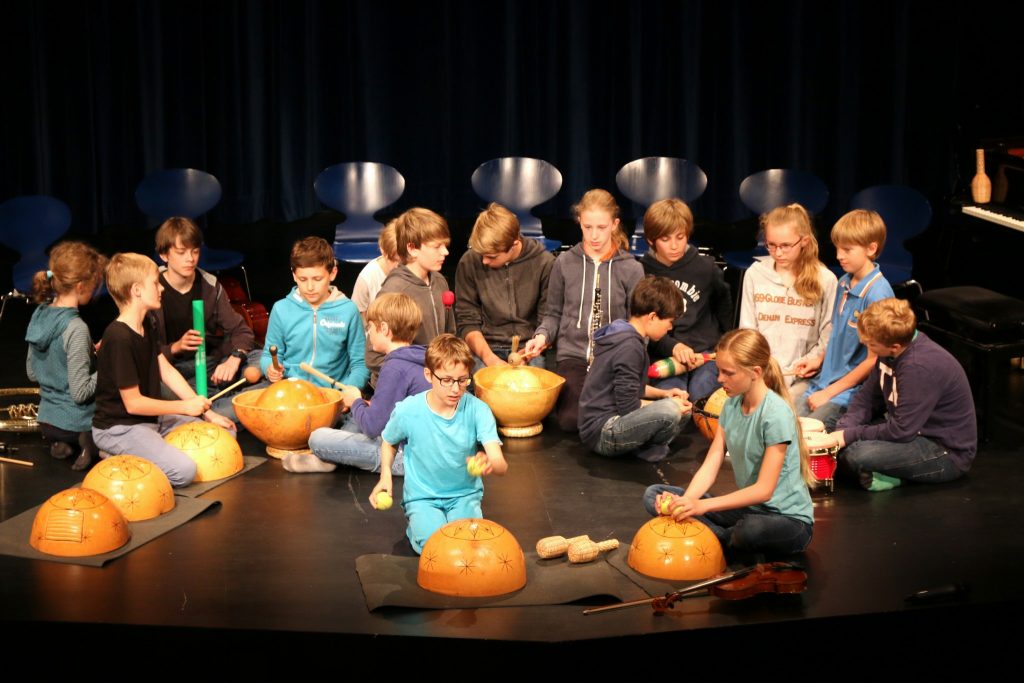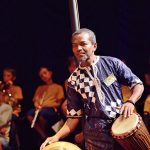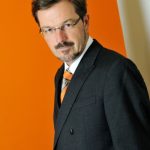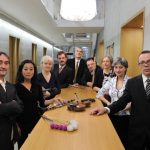- University: PH Freiburg (University of Education), Music Department & Department of Music Cultures in Dialogue
- Ensemble: ensemble recherche
- School: Friedrich Grammar School Freiburg with grade 5/6
- Concept: Creative music production inspired by the features of African music & Contemporary music
University: PH Freiburg (University of Education Freiburg)
Who participated in the project?
The Department of Music at the University of Education Freiburg with:
- Dr. Georg Brunner, project manager/coordinator
- Susanne Kittel, concept development and testing
- Mario Hamann, website concept and development
- Daniel Fiedler, evaluation/finances
- Julia Valérie Berger and Dorothea Berner, contributing to introduction texts
- …and the Department of Music Cultures in Dialogue (Abteilung Musikkulturen im Dialog – AMiD) with Pape Dieye, concept development and testing. Pape Dieye, percussionist from Senegal, specialises in traditional and modern West African music. He lives and works as a musician, composer and instrument maker in Freiburg im Breisgau.
What new experiences and insights were gained in the project?
Through the coordination of the twelve partners, extensive experiences could be gained, particularly with regards to communication, dealing with different work cultures and project management. A positive development took place in these areas.
The continuously growing relevance of the online presence, which culminated in the publication of the online materials, required the consideration of diverse needs. New experiences were gained, especially in the comprehensible documentation of the website, as low-threshold access possibilities for the project teams had to be guaranteed throughout.
The intensity, seriousness and motivation of pupils in the development of their own music pieces and in the encounter with foreign music cultures made for a particularly impressive experience during the practical phase in school and the testing of the learning materials. At the same time, encountering other learning cultures required much patience until satisfactory results were achieved.
Ensemble: ensemble recherche
Who participated in the project?
For more than 30 years, ensemble recherche, a chamber music group consisting of nine musicians, has been specialising in the performance and teaching of new music (www.ensemble-recherche.de). As well-versed experts in this field, Barbara Maurer (viola) and Klaus Steffes -Holländer (piano) took part in the project.
What was the role in the project?
Our role in the preparation (team meetings, seminar sessions at the PH Freiburg with music students) was to contribute musical contents and practical strategies which were to be tested and implemented with 6th grade pupils (11-12 years old). Rather than presenting pupils with already “finished” plans, it was important to us to trust in their creative impulses. In the practical phase in school, we provided musical support and supervision to pupils and helped them gain insights in the new music through short, moderated concerts.
What new experiences and insights were gained in the project?
Due to the extended duration of the practice phase in school, there was room for initial scepticism, playful freedom from purpose, experiments – even outside the school building, improvisation concepts, and for trying out individual suggestions from pupils. All of the involved partners could therefore invest the necessary patience to wait until pupils developed interest out of their own and saw future results as the product of their own creativity. The final concert as the set goal played an immensely vital role in terms of pupils’ motivation and experience. As musicians, we were very grateful for the teacher’s presence on all occasions so we did not have to worry about noise levels and discipline. It was impressive to see how pupils grew with their creation. In the end, the 11-12-year-olds appeared almost grown up when they presented their music on stage.
The practice weeks in Brno and Freiburg resulted in the combination and concentration of the first and second work processes, also in the encounter with the pupils of the other countries. The practice weeks were the biggest investment on the part of the pupils (they took place during school holidays) and brought the strongest intensification and identification. The group grew together into a strong team, learned to appreciate their own qualities and created a truly original and varied suite that is well worth listening to.
Barbara Maurer / Klaus Steffes-Holländer
School: Friedrich Gymnasium Freiburg (Friedrich Grammar School Freiburg)

Who participated in the project?
The Friedrich Gymnasium in Freiburg im Breisgau is a grammar school specialising in classical humanities, modern languages and sciences. Currently, the school has around 350 pupils. With a total of 18 pupils (13 boys and 5 girls), class 6a is a very small class.
What was the role in the project?
From October 2015 to the end of June 2016, the class worked together with ensemble recherche and the PH Freiburg team in their weekly double music lessons. Music teacher Steffen Jahnke served as the pedagogical supervisor and supported the creative work with the class.
What new experiences and insights were gained in the project?
The concentration on a single project in class, in this case the production and rehearsal of pupils’ own music pieces, was an unusual experience. Therefore on the one hand, elements of conventional classroom instruction certainly fell short, but on the other hand, the experiences and the learning progress achieved through making music in class on a regular basis were much greater and more intense than usual. Another novel experience was the intensity and the steady commitment to music making in class, which developed out of the regular work on the self-created music pieces. Moreover, meeting and working with the guests from outside school, as well as with the partners from France, the Czech Republic and Hungary was both stimulating and enriching.
Concept: Creative music production inspired by the features of African music & Contemporary music
Potentials
With regard to the promotion of musical creativity, the German team´s topic is creative music production inspired by the principles of African music and Contemporary music.
The promotion of entrepreneurship is based on characteristics such as: initiative, persistence, achievement motivation and self-responsibility.
During the project pupils went through different creative musical processes. Starting off with the first musical idea as far as to perform on stage, the pupils were required to make use of the initially named characteristics. In addition to a comprehensive cultural education they dealer in depth with themselves and their environment, engaged in dialogue with other musicians and participants, used available resources, developed and presented publicly with their own musical ideas with a high degree of personal responsibility.
Structure
Research on how to promote musical creativity by means of using characteristic features of African music and Contemporary music in school contexts was realized in cooperation with university students. The focus was on identifying sources for musical inspiration in real-life situations. Further topics of research were how rhythmic and improvisational skills could be trained and how students could develop a professionally designed performance in an artistic process based on the initial musical idea.
Materials
Material was developed in cooperation of students and senegaleses musicians. The developed course material was going to be tried out and tested among the school partners and in teacher training seminars. The ensemble recherche as artistic partner attended and supported the students´ process of musical creation. They pointed out techniques of composing styles in contemporary music to the pupils.
This encounter was intended to trigger a form of `dialogue` between the two cultural practices. In the course of half a school year, pupils arranged pieces and applied compositional techniques based on the musical idea of this dialogue. Presenting the compositions in a performance offered opportunities to perceive cultural characteristics of each musical technique.
The development and design of the performance was theoretically researched and in addition to that tested in practice. The musical results using techniques of African music practice (e.g. improvisation models) were continuously presented in front of the group involving active engagement of all participants. The methods derived from contemporary music aimed to improve the students’ stage presence in a classical form of performance with a perceptive audience and a performing team of musicians.
Summing up the stages of development of musical creativity concludes in a procedure that should:
- raise awareness of musical phenomena in the students’ everyday life context and therefore serve as an education and differentiation of the culture of hearing
- recreate and practice examples from the African musical culture in combination with practice of body oriented music making activities
- offer options for learning and practicing various models of musical improvisation (e.g. instrumental, vocal, in motion)
- help students to develop and design their own musical ideas
- familiarize the students with the use of African and contemporary methods of composition



